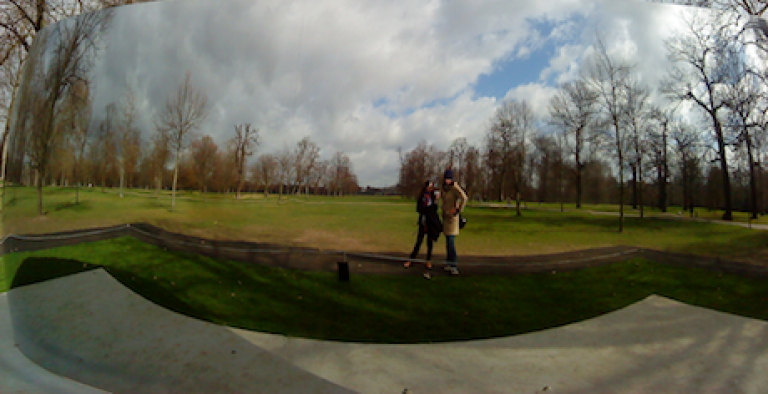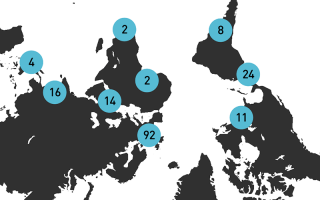Krista and Marisol recount their experiences of studying MSc Building & Urban Design in Developmentat the Development Planning Unit

Krista Canellakis and Marisol García, Co-Founders of UrbanKIT, met in 2009 in London in the BUDD 09/10 Masters programme, studying worldwide participatory urban development and planning processes. Ever since, we’ve been collaborating on projects related to our shared interests in urban and community development, socially and environmentally responsive housing, and catalytic urban transformations.
Marisol (@mgarciago) was born and raised in Santiago, Chile. She studied architecture at Universidad Católica (2000-2006) where she did an extensive research analysis entitled ‘Santiago’s transformation through high density dwellings’ that explored the urban transformation process in central Santiago produced by intense real-estate development that emerged from a new public policy. After completing her undergraduate studies, in 2007, Marisol co-founded a social enterprise in Chile called Gestión Vivienda that is now working in three regions of Chile serving 1900 families. At Gestión Vivienda, she led the development of large-scale low-income housing projects, working with the spectrum of urban development actors to meet a community’s housing needs.
With years of experience working with communities in the field in Chile, Marisol wanted to investigate the theoretical and practical aspects of urban development from a more international perspective. She wanted to investigate how the discipline of urban design can respond to the challenges presented by rapid population growth, urban transformations and ongoing poverty. Her interest in the intertwined relationship between social process and urban design practice led her to the DPU. The BUDD programme, besides providing an opportunity to investigate how the social and spatial aspects of architectural practice were connected, provided an interdisciplinary and multicultural view to urban development practice. Learning from fellow BUDDies was one of the most valuable contributions of the programme (besides getting a brilliant business partner!).
The critical role everyday people have in a place-making process guided her Master’s research dissertation. This research further developed and published together with Camillo Boano[1] (BUDD Director and Research Tutor) aims to enlighten the idea of encouraging spatial and cultural agency in a post-disaster context. Following the BUDD program, Marisol worked at the Building and Social Housing Foundation (BSHF) in the UK where she helped to build international networks and disseminate best practice knowledge related to worldwide social housing and community innovations.
A U.S./Australian raised in San Francisco, USA, Krista (@kristallakis) studied International Relations and French at the University of Pennsylvania. At UPenn, she researched how national and international environmental and energy commodity trading schemes could incentivise individuals, companies and governments to adopt more environmentally responsible practices. For five years before arriving in London, Krista worked at a renewable energy company in San Francisco where she led national marketing strategies, managed web projects, and worked with large companies to market and communicate their sustainability commitments.
One might wonder how this path leads to the DPU. At the core, Krista is interested in "sustainability" –a term thrown around so often it no longer has much meaning– yet still a concept she's not ready to discard. Sustainable cities are not just cities that use renewable energy, build with “green” materials, and plant beautiful trees. The question is how cities can be conceived to not only be environmentally friendly, but also accessible, affordable and reflective of their citizens.
Through BUDD courses and countless collaborations with her DPU peers, she explored how physical spaces –from buildings to public space to theoretical/virtual spaces of interaction– can be developed in many different contexts on an urban scale. The most valuable aspect of the year in BUDD was the exchange and camaraderie amongst our classmates, and finding together the right ways to take advantage of all of our very different skills, backgrounds, and interests.
In 2012, Krista and Marisol both moved to Chile to start UrbanKIT, an entrepreneurial collaboration that is an amazingly perfect combination of our skills, experience and passions. It has funding and support from a Chilean government start-up accelerator program called Start-Up Chile. At UrbanKIT (@urban_kit), we are obsessed with transforming peoples’ ideas for the city into reality. UrbanKIT is a people-friendly crowd-funding platform where individuals and communities can pitch ideas and win funding for neighbourhood improvements (we love community gardens, parklets, play structures, bike security, sidewalk public services, and murals). Under-utilised and under-imagined urban spaces (freeway underpasses, vacant lots, walls, sidewalks, parking spots) are an untapped canvas for citizen creativity.
Placemaking projects are inherently in public, community-accessible, civic spaces calling for essential hyper-localised ingredients like permits, design, public participation and community buy-in to be successful. On the one hand, city governments are not built for outreach to artistic and design communities and have limited funding and staffing to implement projects. On the other hand, people often express their creative side in sub-optimal ways for the city (e.g. graffiti) and have trouble accessing funding and understanding bureaucratic permitting processes. UrbanKIT aims to connect local government resources and global crowd-sourced funding with the creativity of citizen placemakers by providing a tool for civic engagement.
City funding is usually not that fun. By enabling citizens to select, support and share stories about projects they love, UrbanKIT brings humanity and fun back into funding urban places. We want to mainstream citizen urbanism and bring crowdfunding to new places, people and planners! By taking a small commission only on successfully funded projects, our success is tied to material neighbourhood transformations for committed and engaged cities.
Marisol and Krista are also Partners of Ciudad Emergente, a laboratory of tactics and tools for citizen urbanism. In early 2012, Ciudad Emergente organised an event called "Malón Urbano" where, on two distinct days, we closed a street to car traffic and set up picnic tables for a neighborhood potluck, inviting neighbours to get to know each other and talk about what they want for the future of their neighbourhood. In addition, Marisol, together with another partner of Ciudad Emergente, is currently teaching a course at the Master Program of Urban Projects of Universidad Católica which seeks to open the debate about the role of citizens in urban development analysing strategies where everyday citizens have become drivers of change of their own cities and neighbourhoods.
What unites Krista and Marisol is the aligned interests in citizen-led urbanism. And how everyday citizens can participate in the creation of a city that is uniquely adapted to their needs and aspirations, a city that citizens will be equipped to sustain themselves, because they are the ones that created it.
 Close
Close


